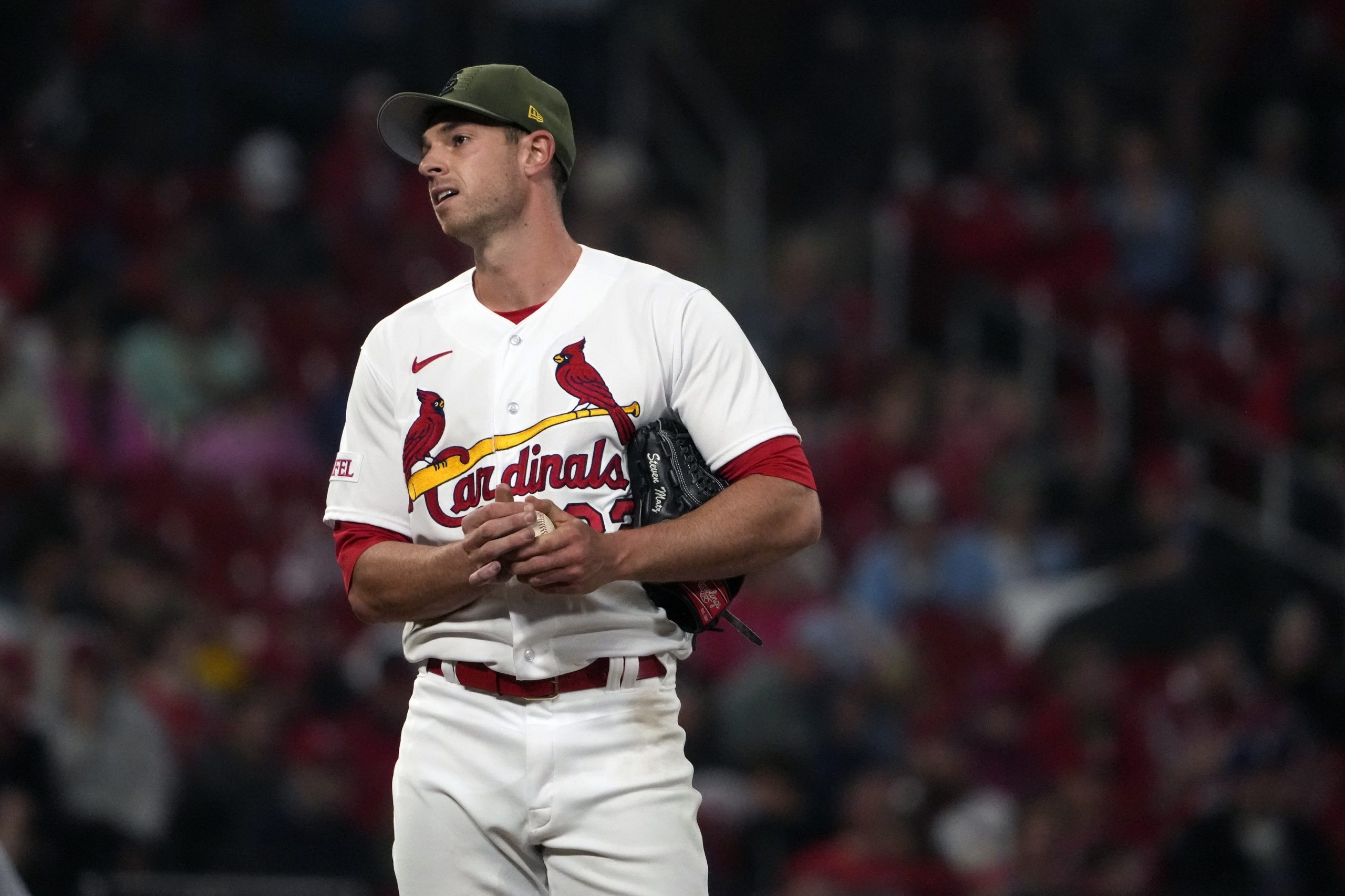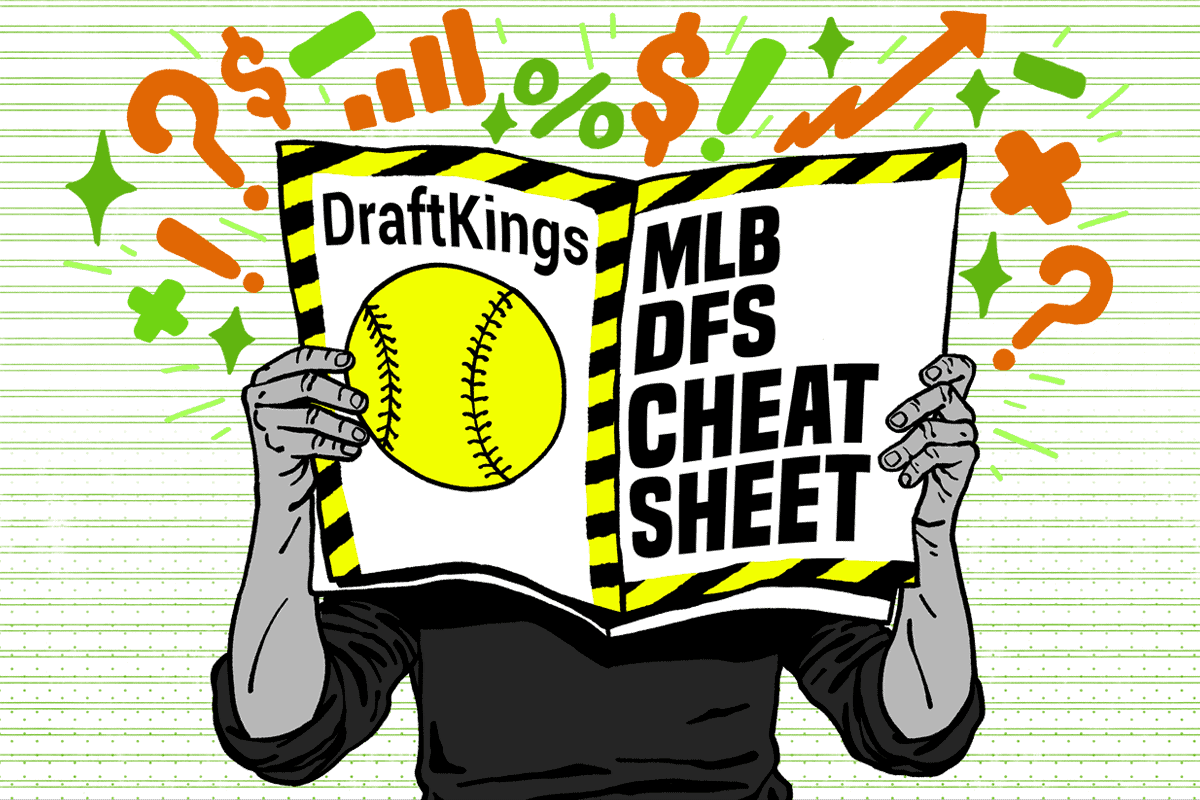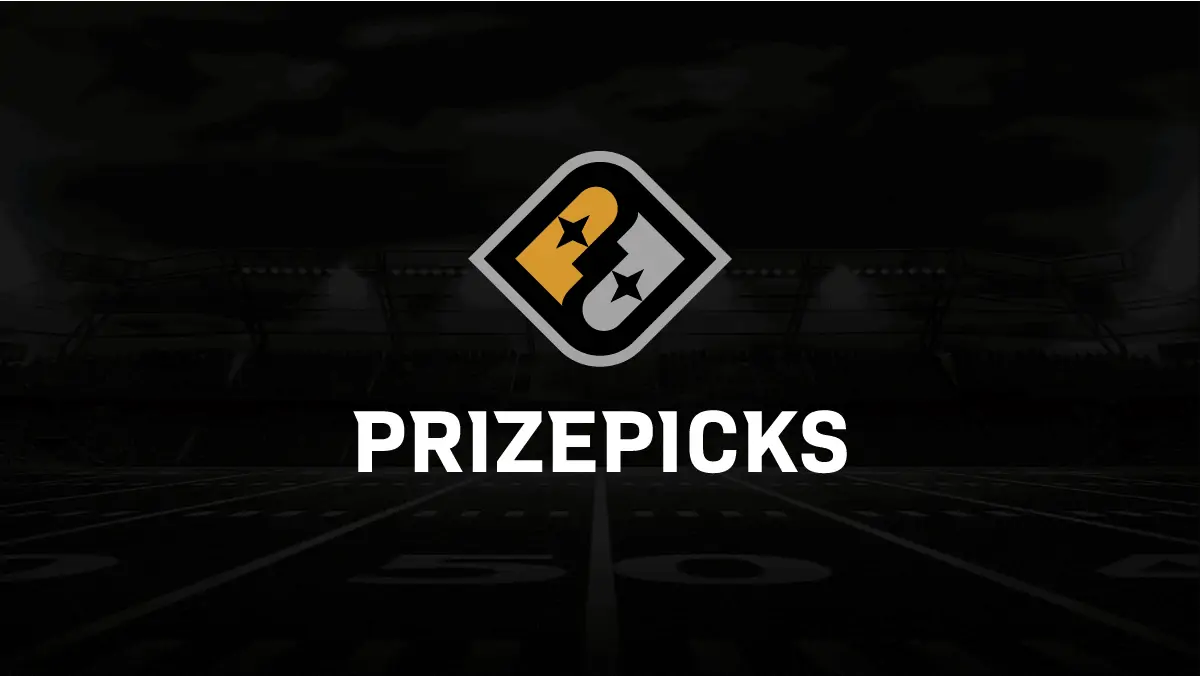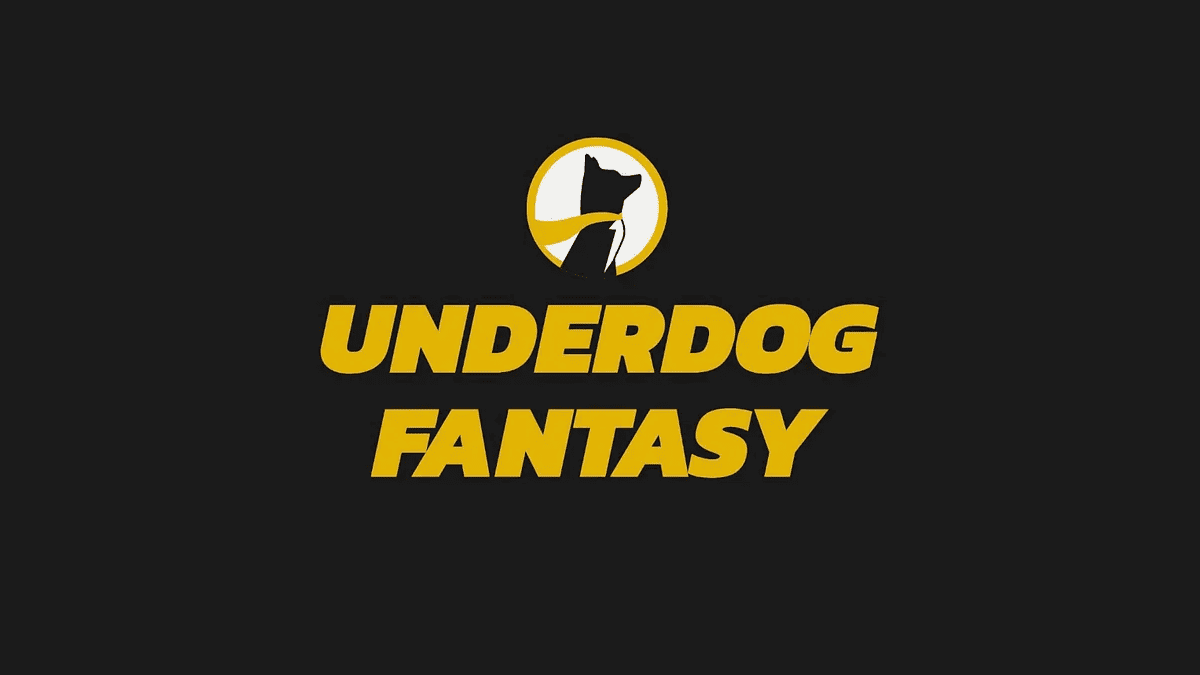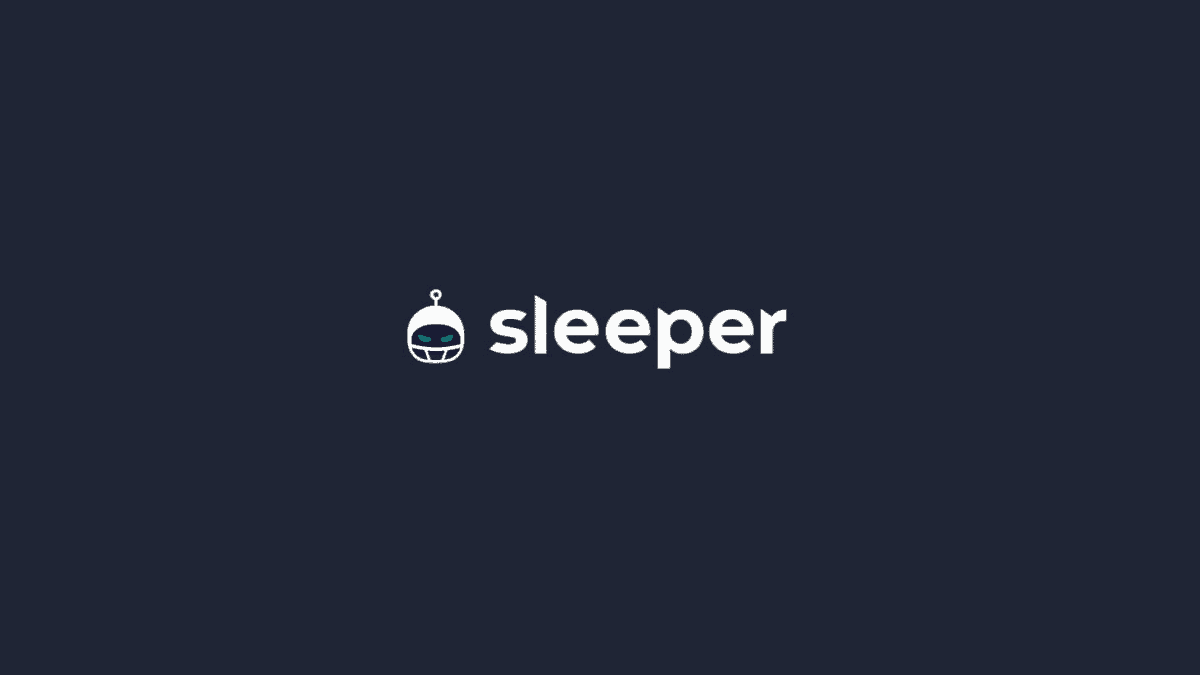Sunday’s three-game Wildcard slate of NFL DFS action features compelling options up and down the board in all three games. There are a handful of value situations that have been created by either returns (JuJu Smith-Schuster) or absences (Leonard Fournette and Tampa’s receiving corps), and every team seemingly has a few low-cost low-owned options in the skill player pool that could conceivably deliver a sneaky touchdown. The board in Vegas has three home favorites, with the tightest point spread coming in the afternoon game between the 49ers and Cowboys at -3. That game is also carrying the highest total on the board at 51, the 49ers and Cowboys will be highly relevant one way or another in NFL DFS lineups today. The late game between Pittsburgh and Kansas City is slanted heavily toward the Chiefs as -11.5 favorites with a 46-point game total, while Tom Brady and the Buccaneers are -7.5 favorites with a 45.5 total in the early game that sees the Eagles visiting Tampa Bay. The absences for the Buccaneers mean a player like Tyler Johnson could jump into relevance on the right day, and the deep sets of skill players on both sides in the late game could provide more options for lineup differentiation.
Groups below are for the individual Sunday main slate, as well as the Showdown contests, in two separate sections. This article focuses on building lineups with a quality foundation by utilizing the powerful Groups and Rules/Limits tools within Fantasy Cruncher. All of the concepts and pairings included below can be applied to hand-building as well, the goal is to create lineups that have high scoring correlation and take advantage of combined outcomes within stacks while limiting the likelihood of building inefficient or negatively correlated entries for a full slate of NFL DFS lineups.
Fantasy Cruncher – New How-To Video
The uptick in questions related to the how-to aspects of Fantasy Cruncher along with several noteworthy new tools demanded a new how-to tutorial video. I put together the above review of all of Fantasy Cruncher’s advanced options with some basic how-to on the constructions, rules, limits, and groups that we use in this article. The tutorial also reviews all of Fantasy Cruncher’s new features and the important distinctions between the various sets of projections that are available.
DraftKings & FanDuel NFL DFS Lineup Optimizer Picks & Projections
Overview
The Week 1 article featured a deep dive into the general settings menu and various utilities within Fantasy Cruncher, it is still available for anyone who would like to refer back. We will maintain the list of rules and limits below throughout the season, with occasional tweaks, if needed. Each week sees yet another fresh crop of value plays as situations change and injuries create opportunities around the league. These changing roles and emergent value plays are accounted for in the process of creating these groups from week to week. After a large pool of lineups is created utilizing these groups, it is still of critical importance to filter them for factors including ceiling projections and leverage potential, as well as our optimal lineup rates and Boom/Bust potential. Getting to a strong mix of the most optimal positively leveraged plays will be a strong foundation for a large pool of tournament lineups.
DraftKings + FanDuel Stack Rules – Sunday Three-Game Main Slate
This set of rules will force Fantasy Cruncher to build lineups with certain combinations. We are looking to always stack at least one skill player, ideally a pass-catcher, with his quarterback while also playing a skill player from the opposing team in the lineup. The theory behind this build is that a high-scoring stack will require some response from the opposing team to truly deliver a ceiling score in most situations, otherwise the team that is ahead will simply slow down and run out the clock. These rules are applied by completing the sentences with selections from the drop-down menu, they follow a very straightforward logic. Exceptions can be made for teams at the bottom of the rule creation window. After a rule is set, click the blue bar to add it, it will appear at the bottom of the screen as a completed rule.
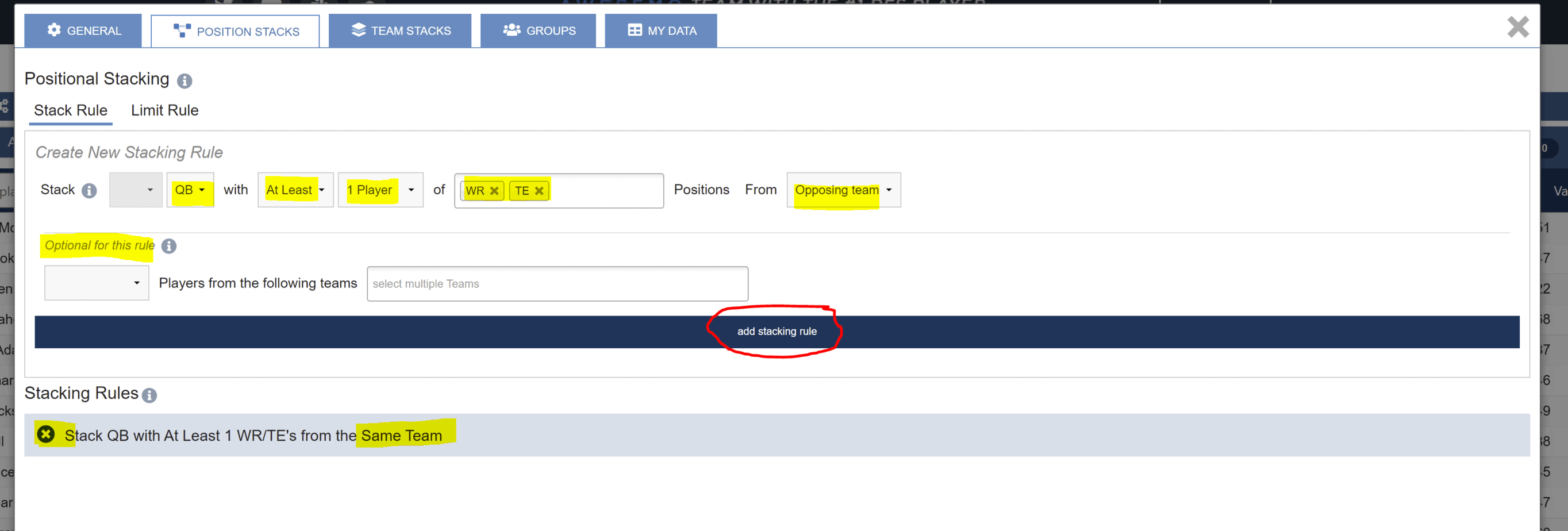
QB with at least one WR/TE from Same Team (note: It is fine to make this two or to utilize two of these, one with WR/TE and one with RB/WR/TE, but we can refine that and get it exactly how we want it for each team via Groups)
QB with at least one RB/WR/TE from Opposing Team
QB with at most zero DST from Same Team (this is more of a personal preference; high-scoring teams and quarterbacks tend to leave their defenses on the field exposing them to simple point-scoring negatives)
Limit Rules
Limit rules can be applied to restrict certain combinations from coming together. This is powerful for limiting multiple running backs from the same team or getting overweight to a certain stack within a lineup.
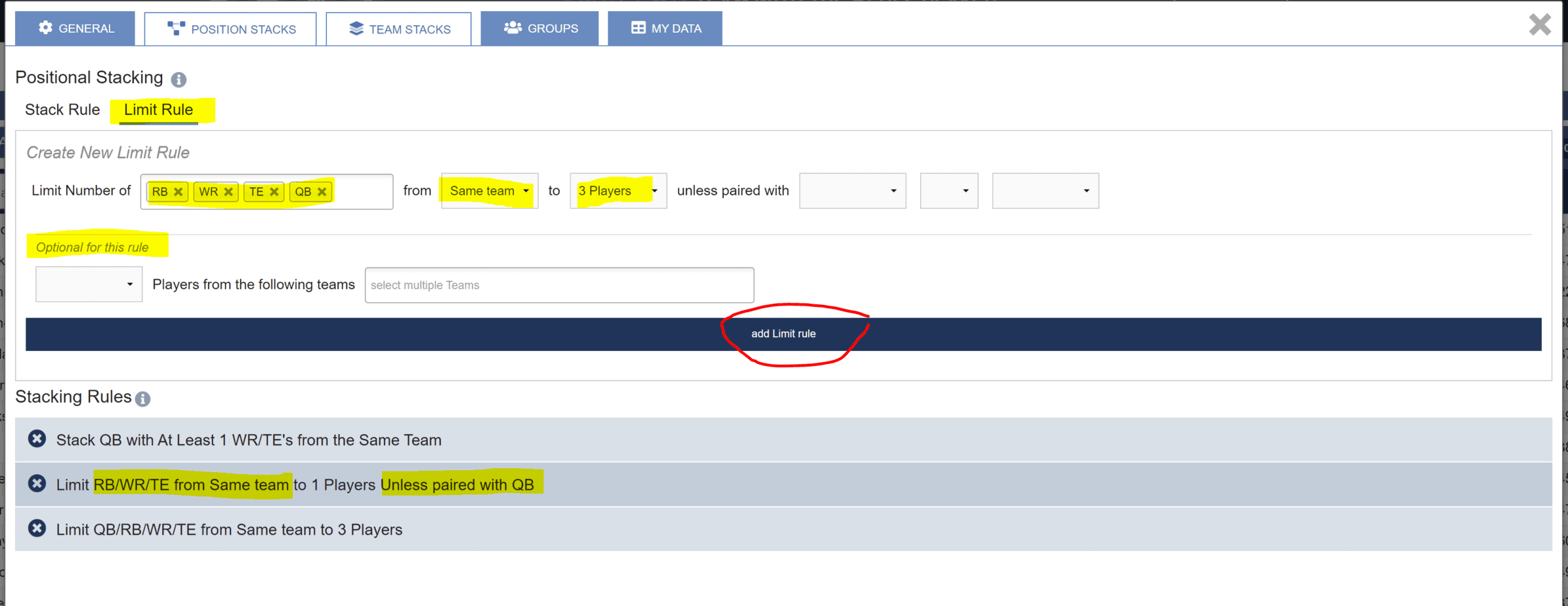
Limit QB/ RB/WR/TE from Same Team to three
Limit RB/WR/TE from Same Team to one two unless paired with QB from Same Team OR Opposing Team
Limit RB from Same Team to one (one can also do this with WR in a separate rule that adds an “unless paired with QB or opposing QB,” but it is a personal preference for NFL DFS)
Note: Allow one (or more if desired) offensive player against team defense in Advanced Settings as well to give Fantasy Cruncher more elbow room in lineup constructions.
Construction
These groups are built by utilizing the quarterback as the KEY player (by clicking the key icon next to his name), with the thinking that the quarterback play is the driving factor in which stack is utilized in that lineup. Built to specification, each team will have two groups, a team group, and an opponent group, both of which utilize the same quarterback, so four groups per game. This is the best approach to truly capture the requirement of playing individual “run-back” plays from the opposing team. A more basic approach would be to include all of the skill players from a game in each quarterback’s group and rely on rules and limits to restrict any potential overflow. It is highly recommended to save the Week 1 groups as a foundation that will be updated for the rest of the season. The recommended groups will include skill players who have an active role in their offense and provide significant correlation with their quarterback’s scoring, quite often bell-cow running backs who do not specialize in the passing game will not be included in groups as they are projected highly and appear on their own in basically correct distributions, while also not always providing the strongest positive correlation plays. Stacking quarterbacks with pass-catchers and allowing running backs to fall into the lanes then crated by settings, available salary and randomness should create a well-distributed set of quality lineups. These groups are updated weekly to account for changes in utilization, schemes, injuries, target shares, and more.
Sunday Update
All of the groups and recommendations below are up to date as of very early Sunday morning. Boosts are included to help create a spread of players that will be viable for selecting upside lineups that have a chance of being differentiated from the field.
Latest NFL DFS Content
- Want to Learn How to Win a DraftKings Milly Maker With Stokastic Sims? Steve Buzzard Will Tell You How
- PrizePicks, Sleeper & Underdog Cheat Sheet: Best More/Less Picks Today for NFL (February 11)
- DraftKings NFL Cheat Sheet: Super Bowl Sims Picks | George Kittle
- NFL Super Bowl 58 DFS Picks: 49ers vs. Chiefs (February 11)
- NFL DFS Captain Picks for Super Bowl 58: Rashee Rice, George Kittle & More
- Stokastic DFS on Youtube
NFL DFS Optimizer Picks: Wildcard Week Team Groups for DraftKings & FanDuel – Sunday Main Slate
The goal here is to create a large pool of well-built lineups that can be utilized in any large-field GPP contest. Crunch far more lineups than needed and utilize a sorting table in Excel to filter to the best set of lineups for entries. The lineups created in these crunches should provide a broad distribution that includes some of the lower-owned skill players from each stack. Applying boosts is critical in pushing and pulling ownership on individual players within their team’s stacked lineups.
The groups below are designed so that each quarterback will have two groups to create, one with his skill players and another with the opposing team. A more basic approach would be to add them all to one large group with an “at least three” and let rules and limits set things, but there is a more granular level of control in creating them separately.
Utilizing two groups also allows us to place running backs into the “run-back” position in certain teams while not including them in the primary stack for their team. This is useful when there is a situation with an extremely highly projected running back who does not necessarily fit into his team’s passing game. These players are threaded throughout the following construction recommendations.
Dallas Cowboys
Key Player: Dak Prescott
Setting: At least one
Group: CeeDee Lamb (-10%), Amari Cooper, Dalton Schultz (+25%), Cedrick Wilson (+15%), Blake Jarwin (+125%), Ezekiel Elliott, Tony Pollard (+15%)
Opposing Setting: At least one
Group: George Kittle (-15%), Deebo Samuel (-15%), Brandon Aiyuk, Jauan Jennings (+35%), Mohamed Sanu (+125%), Eli Mitchell (-10%)
Kansas City Chiefs
Key Player: Patrick Mahomes
Setting: Between one and two
Group: Travis Kelce, Tyreek Hill (-15%), Byron Pringle (+25%), Mecole Hardman (+65%), Demarcus Robinson (+75%), Josh Gordon (+125%), Darrel Williams (Q) (-30%) (Darrel Williams is questionable early Sunday, if he does not play the other running backs will get into a lot of lineups on price alone, they should be included here with downward bumps to control exposures)
Opposing Setting: At least one
Group: Diontae Johnson, Chase Claypool (+15%), JuJu Smith-Schuster, Pat Freiermuth (+25%), Najee Harris (-20%), Ray-Ray McCloud (+125%), James Washington (+125%)
Philadelphia Eagles
Key Player: Jalen Hurts
Setting: At least one
Group: Dallas Goedert, Devonta Smith, Jalen Reagor, Quez Watkins,
Opposing Setting: At least one
Group: Mike Evans, Rob Gronkowski, Ke’Shawn Vaughn (-25%), Breshad Perriman (+15%), Tyler Johnson (+15%), Cameron Brate (+35%)
Pittsburgh Steelers
Key Player: Ben Roethlisberger
Setting: At least one
Group: Diontae Johnson, Chase Claypool (+25%), Juju Smith-Schuster (+10%), Pat Freiermuth (+35%), Ray-Ray McCloud (+125%), James Washington (+125%), Najee Harris (-10%) (Smith-Schuster’s low salary on both sites will have him in a fair number of lineups without adjustment to his projections)
Opposing Setting: At least one
Group: Darrel Williams (Q) (-25%), Tyreek Hill, Travis Kelce, Byron Pringle (+35%), Mecole Hardman (+50%), Demarcus Robinson (+50%)
San Francisco 49ers
Key Player: Jimmy Garoppolo
Setting: At least one
Group: George Kittle, Deebo Samuel, Brandon Aiyuk (+15%), Eli Mitchell (-15%), Mohamed Sanu (+125%)
Opposing Setting: At least one
Group: CeeDee Lamb (-20%), Amari Cooper (-10%), Cedrick Wilson (+5%), Dalton Schultz (+15%), Ezekiel Elliott (-15%), Tony Pollard (+10%), Blake Jarwin (+125%)
Tampa Bay Buccaneers
Key Player: Tom Brady
Setting: Between one and two
Group: Ke’Shawn Vaughn (-25%), Mike Evans, Rob Gronkowski, Breshad Perriman, Tyler Johnson, Cameron Brate (+25%)
Opposing Setting: At least one
Group: Dallas Goedert, Devonta Smith, Quez Watkins (+25%), Jalen Reagor (+50%)
NFL DFS Optimizer Picks: Wildcard Week Team Groups for DraftKings & FanDuel – Sunday Showdown Slates
Small Sample Central — Trends and Notes
Several of the primary lineup construction notes from previous versions of the Showdown article will continue to be listed in this space, but each week we will attempt to find parallels based on Vegas data and the general game environment from historical contests in the pool of DraftKings Showdown research from 2019 through this week’s contests. It is important to not get too focused on results-based thinking in such a small sample. Quality lineup construction is always the focus, but historical results can help inform some basic decisions in a pricing and ownership vacuum. A quick summary of that previous content:
- According to tracking data for DraftKings Showdown contests over 2019 and 2020, only 17 of 95 slates were won with a quarterback Captain.
- Across the same sample, wide receivers and running backs split the outcomes evenly, with 33 tournament-winning events each.
- Of the 38 times that a wide receiver or tight end was in the winning Captain position, only three of those builds did not include at least one quarterback in a Flex position.
- Thirty-five of 95 winning lineups featured at least one defense, but only two of those featured both defenses.
- Twenty-nine winning lineups featured at least one kicker, but only two of those included both.
- Only eight winning lineups included at least one defense and one kicker, while one person won a tournament with two defenses and a kicker in 2019.
A prominent theme all season has been the value of the quarterback position in the flex role in DraftKings Showdown slates. The salary at which the position typically lands makes the multiplier a major factor in lineup construction. Within the various samples, including in games with totals and point spreads similar to both of Saturday’s contests, the position is almost always included in a winning lineup, and the vast majority of those builds are optimal with passers in flex spots.
Looking first at the 51-point total in the afternoon game, there are 13 games in our small data set that are within a point of the game total. Of those 13 contests, seven were won by pass-catchers in the Captain role on DraftKings. Quarterbacks and running backs split the remaining six Captain victories evenly. Every one of the 13 lineups included at least one quarterback and six of the 13 lineups rostered two passers, none of which used one of the quarterbacks in the Captain role. 7 of the 13 winning lineups were 3-3 constructions, with three 5-1 builds, a pair of 4-2s and a 2-4 filling out the remaining winners.
The first game and the final game are totaled at 45.5 and 46 respectively. The sample includes 16 contests carrying totals between 44.5 and 46.5, and they take a slightly different shape than the more highly totaled contests. Within this sample, only four of the winning lineups were built with pass-catcher Captains, while running backs lead the way with six winners. Quarterbacks add three Captain winners and a kicker Captain victory is thrown in for good measure. Only one of the 16 winners failed to roster at least one quarterback, and six of them included both signal-callers. Defenses appear in winning lineups five times and kickers land in lineups in three flex spots in addition to the one oddball kicker Captain winner.
DraftKings + FanDuel Stack Rules
QB with at least one RB/WR/TE from Opposing Team (this will happen naturally in most Showdown constructions, but including the rule will eliminate lineups that feature only an opposing kicker or quarterback)
QB with at least one WR/TE from Same Team (this will happen naturally in a large portion of lineups, but stacking quarterbacks with pass catchers is the easiest way to rack up NFL DFS points. It makes sense to include this rule to force the build, in most situations)
Limit Rules
Limit rules are slightly less important for Showdown slates as there are only two teams to choose from. They are still useful for preventing suboptimal constructions, however. Including the following will help prevent these less likely builds.
Limit QB/RB/WR/TE/DST/K from Same Team to three unless paired with Captain
Limit RB from Same Team to one (this is a rule that can be toggled on and off over multiple crunches, but the preference for this slate would be to use it)
Limit K from Same Game to one
Limit DEF from Same Game to one
Construction Basics
We will utilize Fantasy Cruncher’s Groups utility to create specific builds. The Groups feature includes the ability to designate players as the key to the group, or the player whose use in a position will trigger the group requirements. For Showdown slates this can be utilized to force specific sets of players or positions along with each type of designated Captain. The example below shows a group that utilizes Rob Gronkowski in the Captain role as the key player. It will then force all constructions featuring Gronkowski in the Captain role to include at least three of the players listed in the group including both quarterbacks as well as a mix of positively leveraged or lower-owned flex options from both sides.
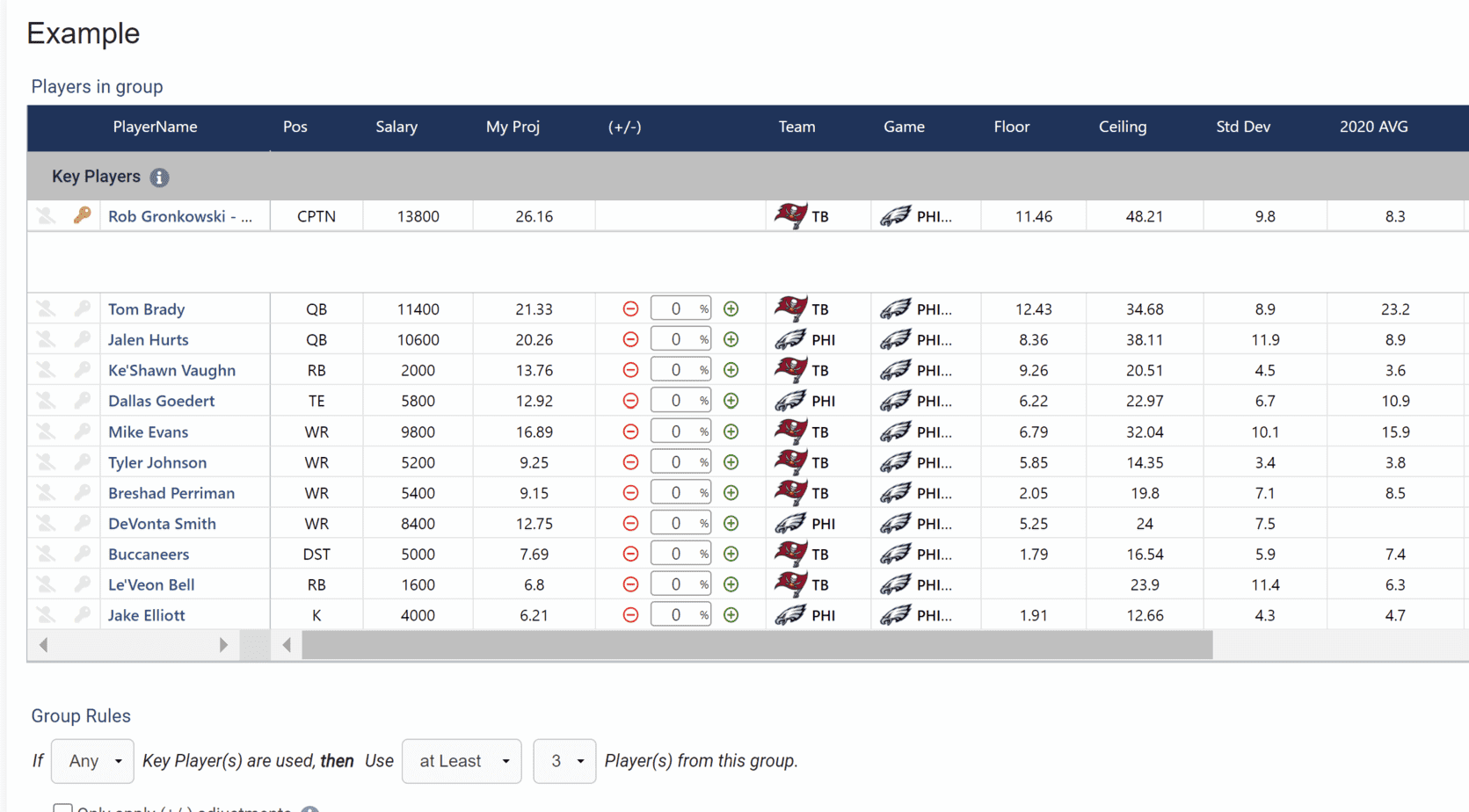
NFL DFS Optimizer Groups & Picks
Unlike multi-game slates, when attacking individual potential game scripts, these groups are better deployed individually for separate crunches that can then be combined into a single pool of lineups. Running them all at once is likely to create conflicting scenarios that will either prevent or limit a full crunch.
Quarterback Inclusion
The first wrinkle in utilizing Groups to create specific constructions is that the tool differentiates between a wide receiver or running back and the same player in the Captain or MVP spot. This requires the creation of a group that adds the Captain version of any likely skill player as the key player, with a rule setting that any lineup featuring any of these players must include one of the quarterbacks in a Flex position. The alternate approach to this problem is to remove all but the skill players from potential inclusion at the Captain spot then create a rule that will simply stack the quarterback with the Captain spot, but that approach is likely more flawed. This group does not currently force quarterbacks when defense or a kicker is used at Captain.
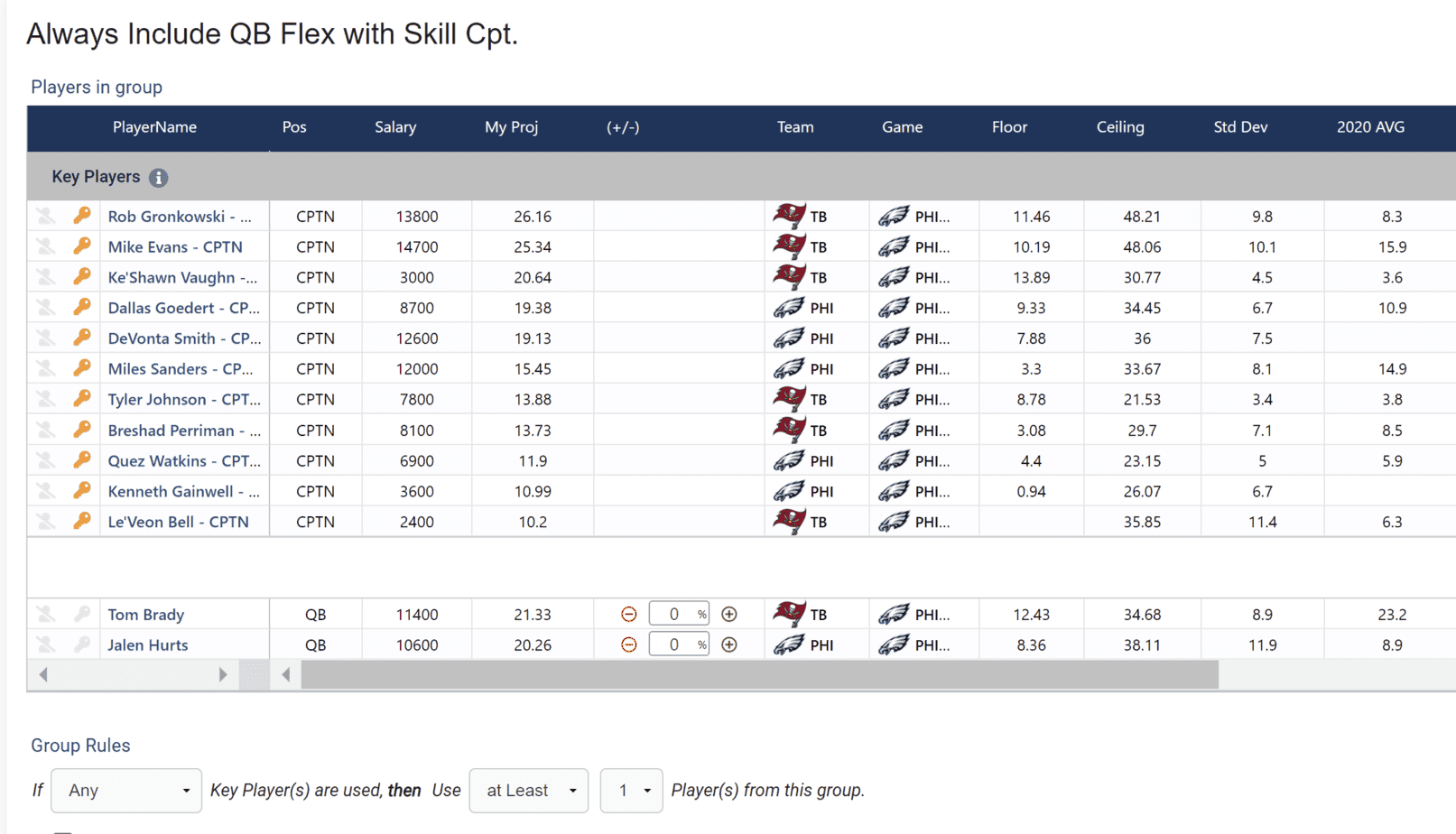
Key Players: All primary skill-players as Captain
Setting: At least one
Group: Tom Brady & Jalen Hurts – Standard versions
This group will result in getting one of the quarterbacks whenever any of the listed primary skill-players is utilized at Captain. To force the quarterback from the same team, multiple groups should be created for skill players from each team utilizing just the quarterback from that team. When quarterbacks appear in Flex positions, the rules and limit settings will kick in to force optimal constructions in the other Flex roles.
Note: Repeat this same concept for the quarterback inclusion group in the second and third games, grouping all relevant skill players in the Captain roles with the standard versions of quarterbacks as the grouped players in both situations.
NFL DFS Concept – Tampa Bay Overload
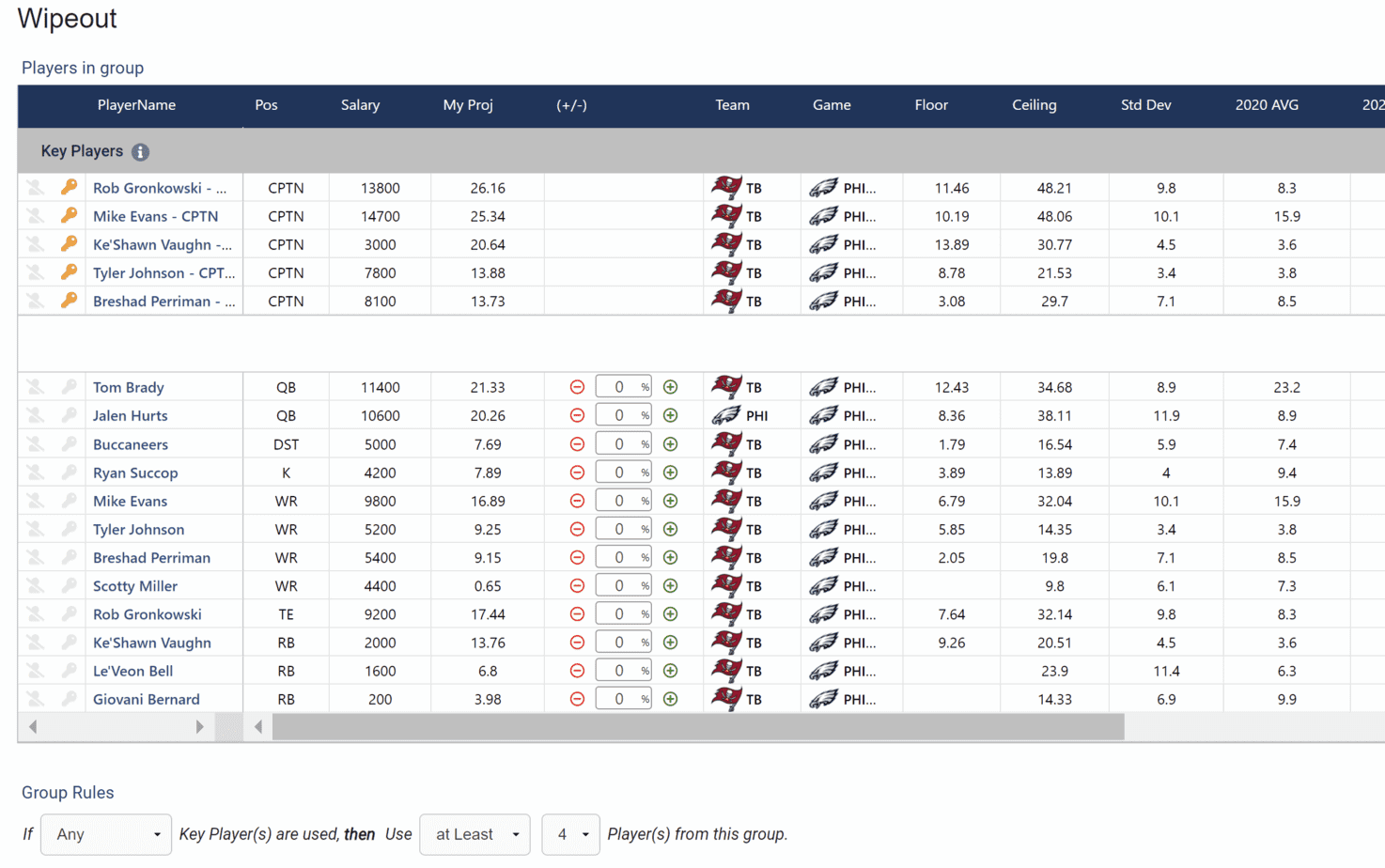
Key Player(s): Rob Gronkowski, Mike Evans, Breshad Perriman, Tyler Johnson, Ke’Shawn Vaughn
Setting: At least 4
Group: Tom Brady, Jalen Hurts, Buccaneers Defense, Ryan Succop, Mike Evans, Tyler Johnson, Breshad Perriman, Scotty Miller, Rob Gronkowski, Ke’Shawn Vaughn, Le’Veon Bell, Giovani Bernard
This group looks to ride Tom Brady and the Buccaneers’ offense to success. We gain for having some options from the lower pricing and ownership levels, with players like Bershad Perriman and Tyler Johnson gaining relevance in the absence of Antonio Brown and Chris Godwin. The group forces four players from a list that include all of the Tampa Bay skill players, as well as their kicker and defense. Both quarterbacks are included in the group as well, and using this with the rule to force a flex quarterback will ensure that one or the other always appears. This creates a situation where resulting lineups can either be 5-1 configurations with or without Hurts included, where Brady will be in 100% of the lineups that do not include Hurts. It will also allow for a two-man Eagles stack in lineups that do include Hurts, with an additional open roster spot not connected to the group, which will blend some 4-2 constructions into the lineup mix.
Latest NFL DFS Content
- Want to Learn How to Win a DraftKings Milly Maker With Stokastic Sims? Steve Buzzard Will Tell You How
- PrizePicks, Sleeper & Underdog Cheat Sheet: Best More/Less Picks Today for NFL (February 11)
- DraftKings NFL Cheat Sheet: Super Bowl Sims Picks | George Kittle
- NFL Super Bowl 58 DFS Picks: 49ers vs. Chiefs (February 11)
- NFL DFS Captain Picks for Super Bowl 58: Rashee Rice, George Kittle & More
- Stokastic DFS on Youtube
NFL DFS Gameflow – Pass Happy – San Francisco vs Dallas
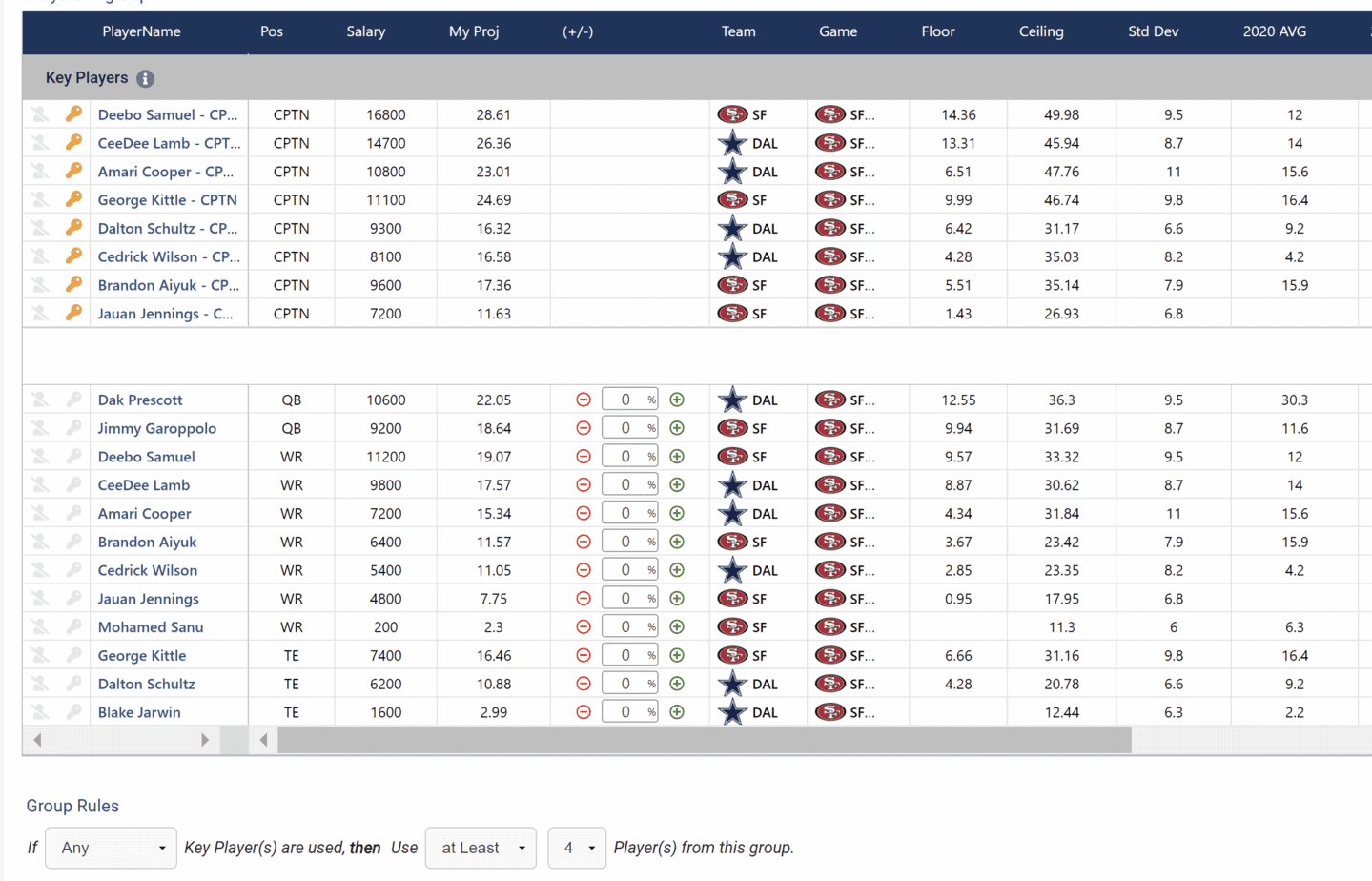
Key Player(s): Deebo Samuel, CeeDee Lamb, Amari Cooper, George Kittle, Dalton Schultz, Cedrick Wilson, Brandon Aiyuk, Jauan Jennings
Setting: At least four
Group: Dak Prescott, Jimmy Garoppolo, Deebo Samuel, CeeDee Lamb, Amari Cooper, George Kittle, Dalton Schultz, Cedrick Wilson, Brandon Aiyuk, Jauan Jennings, Blake Jarwin, Mohamed Sanu
This group chases the notion of the passing heavy game script that Vegas is seeing with the higher game total and tight point spread. There are quality pass-catchers on both sides that can get the ball in the end zone and produce fantasy points in a hurry, and the deep set of options provides some flexibility of configurations. The group includes all of the primary passing options, forcing four players from a list that also includes the quarterbacks. This should create largely balanced passing-focused lineups that leave one spot for flex plays from other positions.
NFL DFS Concept – QB Captain Value
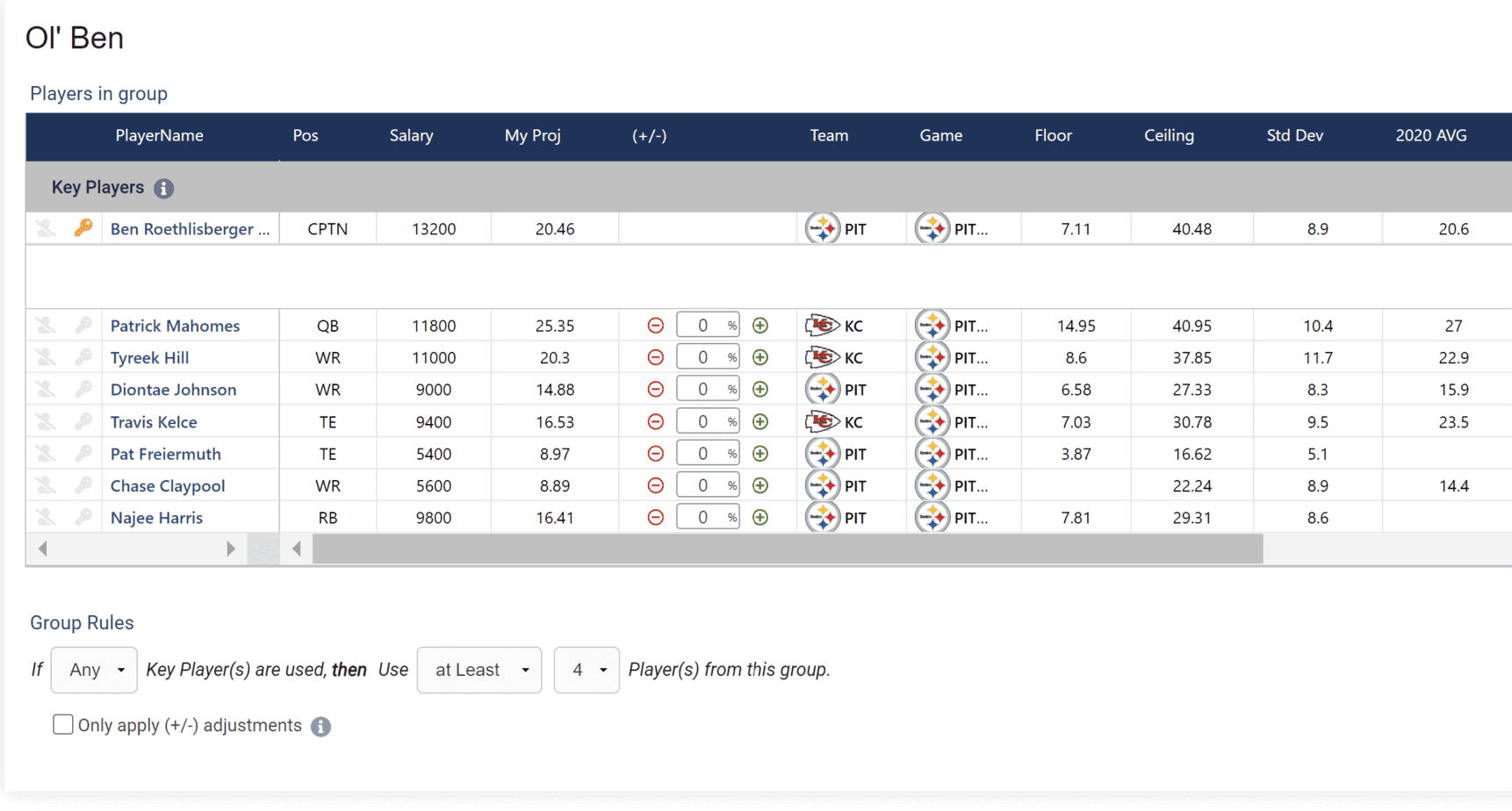
Key Player(s): Ben Roethlisberger – Captain version
Setting: At least four
Group: Patrick Mahomes, Tyreek Hill, Diontae Johnson, Travis Kelce, Pat Freiermuth, Chase Claypool, Najee Harris
This group attempts to fully utilize the salary savings created when Steelers veteran Ben Roethlisberger is utilized in the Captain role on DraftKings. The group forces four from a list that includes the rest of the top shelf items from the game, including Patrick Mahomes and his two primary weapons, and the rest of the most expensive available options. The group will create only a limited number of lineups, but it can be re-run several times to capture a broader sample. Adding JuJu Smith-Schuster, Darrel Williams, or any other lower-cost option, or several of them, will extend the number of available lineups, but will immediately start leaving significant amounts of salary on the table, reducing the value of going to the Steelers quarterback in the Captain spot.
Note: This game has an absurd value play in $200 JuJu Smith-Schuster, who will be rostered at ridiculous levels on the DraftKings NFL DFS Showdown slate tonight. Check the tools update later in the day for his probabilities and act accordingly in lineup creation.
Thanks for reading to the end of this article! If you appreciate this free content and want to see more of it every day, you can help us out by sharing this article on social media!
[NFLPAGE]






